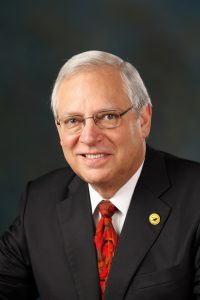Lyons Reflects On Time With Port Of Mobile

Over the past 19 years, the Port of Mobile has invested about $1 billion into port-owned infrastructure and facilities. It currently ranks as the 10th largest port in the United States by tonnage, and on the container side, the Port of Mobile has grown from just 13,288 containers handled in 2003 to 328,431 in 2017.
During that same time period, the Port of Mobile has bolstered legacy cargoes like coal and lumber while also expanding steel and roll-on/roll-off cargoes and incorporating technology into cargo handling to enhance efficiencies.
That steady expansion and smart innovation over almost two decades has come with a single person at the helm: Alabama State Port Authority Director and CEO Jimmy Lyons.
Prior to leading the Alabama State Port Authority, Lyons, a Mobile native and graduate of the University of Alabama, spent 19 years with stevedoring company Ryan-Walsh. When Ryan-Walsh was purchased in 1995, Lyons decided to stay in the Mobile area and start a consulting practice. He grew his consulting business for the next four years. Then on July 1, 1999, he was named director of the Port of Mobile, which at the time was a cabinet-level official appointed by the governor.
“The next year, the state legislature passed legislation establishing the port authority as an authority with a governing board that serves staggered five-year terms,” Lyons said. “So I was hired by the port authority to be the first director and CEO of the Alabama State Port Authority.”
Reflecting on his early years as director and CEO, Lyons pointed to the decision to develop the port’s container terminal as a pivotal moment in the port’s history. And it’s a success story that might not have happened.
“If you look at some of the studies done in the years before I got here … consultants said to focus on your coal and your forestry products and forget containers, they’re all going to the East Coast and the West Coast,” Lyons said. “Well, that’s changed, and the Gulf Coast now has a fair share of the container business.”
Lyons said he and port leadership carefully researched the potential for containers before building the port’s container terminal. What’s come to pass has surpassed what they envisioned.
“I’m very proud of that,” he said. “It was a lot of work and planning. We did three studies before we embarked on it.”
Lyons said he’s also proud of the public-private partnerships (P3s) the port has engaged in under his leadership. P3s during his tenure include the container terminal, a freezer facility, a grain elevator, the cement terminal and a steel terminal.
Lyons also pointed to technological advancements during his tenure as keys to the port’s success. He specifically mentioned the port’s steel slab terminal, which uses radio-frequency indentification, or RFID, tags and GPS to locate and control inventories and even share that information with customers.
“We’ve integrated our handling terminal with their operations,” Lyons said. “It’s a very smooth working supply chain that feeds that raw material into the mill.”
Looking to the future, Lyons named several projects he’s eager to complete. First is the next phase of the port’s container terminal.
“It will be done by the end of 2019,” he said.
Farther down the road, phase 4 and 5 at the container terminal will allow for higher stacking of containers. The port also plans to develop a logistics park behind the current container terminal. Lyons also mentioned the port’s automobile roll-on/roll-off terminal.
Construction should begin early next year and take about a year to complete. Lyons also wants to see the U.S. Army Corps of Engineers get started on the Mobile Harbor channel deepening and widening project.
Through it all, leading the Port of Mobile is more than just a job, Lyons said.
“What I do is a labor of love,” Lyons said. “I enjoy this business. I’ve had a fairly long and successful career in the business. I’ve learned a lot of good lessons.”


